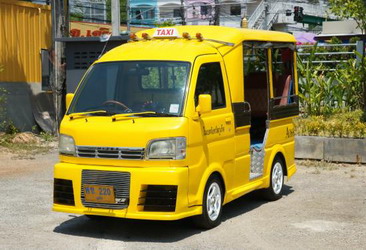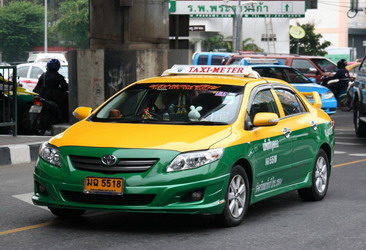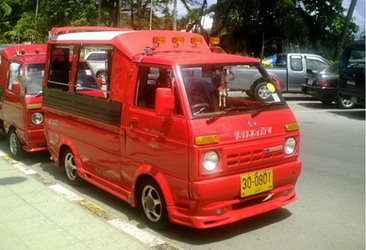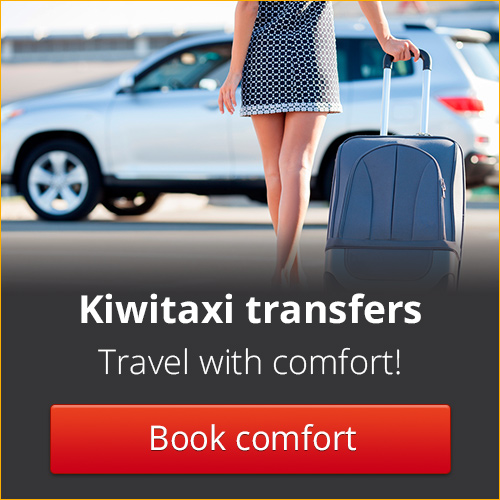 Phuket Taxi Service
Phuket Taxi Service
Phuket is known for its expensive public transport system. Thailand's largest island does not have a cheap-shared songthaew service running in circle like Pattaya, due to its size. The few available local bus lines link Phuket Town to the most popular beaches but not with each other. Consequently, taxis and tuk-tuks are often the only methods to get around the island. However, the fares are heavily inflated and even for short distances of a couple of kilometres, they easily charge 200 baht. Visitors from the west may still find the taxi costs seem acceptable but by Thai standards, they are exorbitant. The current Government is attempting to stop what is called in the Bangkok Post newspaper as the "Phuket taxi mafia", but this is a tough challenge. Taxi drivers often try to avoid any kind of change that could endanger their easy money. Phuket has three types of taxi: an endless number of small songthaew called Tuk-Tuks, a smaller number of conventional Taximeters and limited number of Limousines, which are only private cars with driver and a regular license to exercise the service. Metered taxis are a better option when available, being safer, more comfortable, and usually cheaper than tuk-tuks and limousines. In all Thailand, since 1992, taxis are all equipped with a taximeter that calculates the rate based on the distance covered. Unfortunately, in Phuket there are not enough taxis and are often hard to find, except from the airport, where a good number of taxis is always available. Instead, outside the airport due to limited number, it is no wonder if you have to wait a long time before taking one. Make sure they turn the meter on once you set off, which should charge you 50 baht for climbing into the taxi as a use fee and then 7 baht for every kilometer after the first two. In the event that the taxi is slowed down by traffic and is forced to stop or move at less than 6 km per hour, there is an extra charge. It is good to know that during high season the drivers usually ignore the meter and demand flat fares, especially for long distances. You can try to bargain a little this flat fare, but it will usually be at least a bit more than you would pay with the meter. If you are travelling from the airport, you can choose between limousines or taxis, which in this case require an additional fee of 100 baht above the meter. Limousines are usually newer, larger than taxis, with greater cubic capacity, and even more comfortable. Limousine drivers use a fixed fare, which usually costs a couple of hundred baht more than a Taxi.
Unlike the rest of Thailand, Tuk-Tuk in Phuket is not the iconic three-wheeled vehicle with handlebar controls instead of a steering wheel. They have two-stroke engines that could not climb island's steep hilly landscape. Therefore in Phuket are used small four-wheeled vans as the most common means of transport. They are known as tuk-tuks because Phuket's tourists expect to see tuk-tuks, but in fact, they are just very small songthaews. The Thai word songthaew means 'two rows' and refers to the two rows of seats in the back of the van. Usually painted in bright red, pink or yellow, these small, open-sided minivans can accommodate up to 6-8 people on the two rear benches, which are quite comfortable only in case of short rides. Most are exaggeratedly personalized and a large number boasts powerful sound systems and disco lights set up in the passenger compartment. Tuk-tuks are omnipresent in Phuket; you will find them parked along every beachfront roads up waiting for customers, especially in Patong, Karon and Kata, close to the main attractions or inside the parking lots of island's largest shopping malls. With drivers often, pushy and insistent, tuk-tuks run throughout the island from early morning until late at night. There are no official stops, and a nod with your hand is enough to get on board. Phuket's tuk-tuks have long been a cause of contention, as they are exaggeratedly more expensive than anywhere else in Thailand is. Unfortunately, the tuk-tuk lobby is very effective and has been successful in limiting the number of taximeters on the island, so they are often the only option available. Tuk-tuks have no meter, and their drivers are notoriously mercenary and now charging a ridiculous minimum of 100 baht for a very short ride, 200 baht if you are in Patong. A trip from Patong to Phuket Town can cost from 500 up to 600 baht, as much as double the cost of a comparable trip in comfortable air-conditioned taximeter. Bargaining is possible; it is very advisable to carry this out in a friendly manner before departure.Read More








